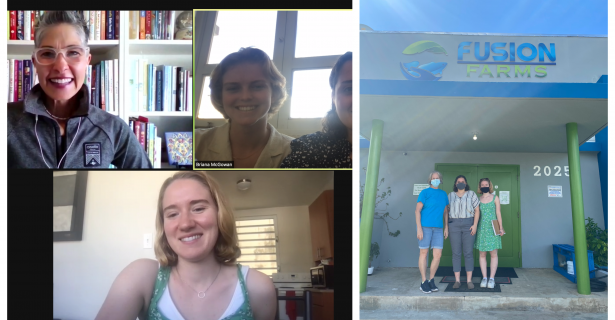This week, we were fortunate to speak to Dra. Anabelle Morales Droz, President and Chief Science Officer at Fusion Farms in Mayagüez, Puerto Rico. Fusion Farms uses Controlled Environment Aquaponics, which combines both aquaculture and hydroponics to create an environment in which both fish and plants grow together in a soilless, closed-loop system. In the aftermath of Hurricane Maria, reports cite that the hurricane wiped out 80% of the agricultural industry, which equates to about $780 million in losses. Fusion Farms was established in an effort to build food resiliency in Puerto Rico by developing a hurricane-safe, indoor farm that can withstand a number of climate-related events. Dra. Morales Droz spoke about the benefits of aquaponics from a sustainability standpoint. For one, aquaponics requires about 90% less water than traditional farming, as water is recycled in its system. Also, unlike traditional farming, Fusion Farms can produce a variety of crops all-year-round, offering stable crop yields. Dra. Morales Droz also spoke in depth about Puerto Rico and how its relation to the United States affects its food resiliency.
For one, in the mid-1940s, Governor Luis Muñoz Marín introduced an initiative to modernize the economy of Puerto Rico through a number of economic efforts in what is known as Operation Bootstrap. Its main development strategy centered around the industrialization of the territory, and today, the Puerto Rican economy is driven by the manufacturing of pharmaceuticals, textiles, petrochemicals, and electronics. As a result, Puerto Rico imports over 80% of its food, which greatly impacts the territory’s food resiliency. Furthermore, food security in Puerto Rico is certainly affected by the Merchant Marine Act of 1920. Under this law, “all international commerce into the archipelago needed to first be accepted at a mainland port and be transported on ships that are staffed, built, owned and operated by citizens of the USA or permanent residents”. This results in goods being 25%–30% more expensive than if this act was not enforced, which greatly increases the cost of living on the island and thus the food security of Puerto Ricans. Dra. Morales Droz mentioned that, as a result of laws like this, produce must travel thousands of miles to get from farms outside of the island to local Puerto Rican markets, and how so much nutritional value of produce is lost by the time the produce ends up in the hands of Puerto Rican consumers. Fusion Farms hopes to address these concerns by providing fresh, healthy produce to Puerto Ricans that is grown and harvested on the island. After speaking with Dra. Morales Droz, we had the chance to tour Fusion Farms and meet with Co-Founder and Director of Sustainability, Art, and Education, Lisa Jander, to learn more about their aquaponics system of farming, and we even had the chance to taste test a variety of their produce!

